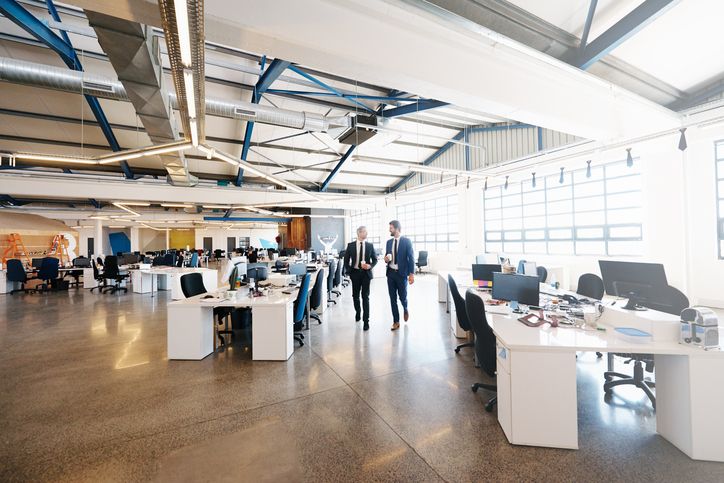 Technology companies have long led the way in workspace trends. From the ping pong tables of the early dot-com start-ups to the lush campuses of Silicon Valley firms today, cool and creative amenities serve as markers of the flexible, innovative cultures that distinguish start-ups and industry disrupters from their more staid corporate peers.
Technology companies have long led the way in workspace trends. From the ping pong tables of the early dot-com start-ups to the lush campuses of Silicon Valley firms today, cool and creative amenities serve as markers of the flexible, innovative cultures that distinguish start-ups and industry disrupters from their more staid corporate peers.
And, as office trends that began in the tech sector – like open-plan layouts and snack-filled break rooms – enter the mainstream, innovators race to out-do each other with ever-more creative takes on the traditional work space. Indeed, many features once thought of as having a distinctly “start–up” feel, like 24/7 building access, high speed connectivity, lounge space and gyms, are now virtually standard issue for tenants in any industry looking to hire and retain young, educated workers.
Ball pits and climbing walls
For some technology companies, this motivates a kind of office perk arms race: if an in-house yoga studio and rooftop garden aren’t impressive enough to make the case for them as a desirable employer, make way for the lobby ball pit and the indoor climbing wall. Business media reinforce this escalation with lavish photo spreads of the coolest workplaces and click-bait slide shows of the most employee-pampering fringe benefits.
“For all the trends we see coming in and out of fashion in office real estate, the essential requirements of the modern workspace remain fairly constant.”
Certainly, the design ethos of tech start-ups has led to some real improvements in office space for all professions. There’s an increased understanding among office tenants about how the right space, configured in the right way, can improve employee satisfaction and productivity. Biophilic designs are making their way into the modern built environment, with natural light and even vegetation inside workplaces, creating offices that can support sustainability efforts and reduce employee stress levels. More attention to acoustics and the need for flexible configurations and privacy-on-demand in open work spaces has improved the quality of work-life for many erstwhile cube-dwellers.
Innovation in function, not form
For all the trends we see coming in and out of fashion in office real estate, though, the essential requirements of the modern workspace remain fairly constant. Employers want offices in secure, well-maintained buildings, in locations convenient and desirable to their workers, with sufficient room and a workable layout to accommodate everyone. Certainly some of this is open to interpretation: the rise of shared-ride hailing apps means that a location near a transit stop isn’t nearly as important as it once was. But, mostly, after the basic criteria are met, the benefits of one space over another can be relatively small.
In fact, studies show that employee recruitment and retention, often cited as the primary drivers behind the “cool office” trends in tech, are influenced far more by workplace policies, such as flexible schedules, remote work arrangements and generous paid leave, than by any physical features of the workplaces themselves. Indeed, for most employers, the business case for ultra-high-end or cutting edge space is pretty weak. Just as the business press so often has been wrong in chasing the sexiest start-ups rather than those with the most sound business plans, the hype around ultra-hip offices is completely overblown.
In this dynamic market, the decisions the smartest tech firms are making around real estate have little to do with space and everything to do with the terms on which they can lease it.
Entrepreneurs understand entrepreneurs
Building owners and property managers seek long-term leaseholders and structure the deals they offer accordingly. But, while the cost structure of a long-term deal might seem advantageous, start-up and other early stage ventures are better off seeking more flexible lease terms to align with their fundraising rounds and market dynamics. Indeed, being locked into a long-term lease with no provision for growth or exit has no advantage for a firm that has equal chances of growing tenfold, getting acquired or failing all together within a three- to five-year business cycle.
Business-savvy entrepreneurs focus on terms first when making their real estate decisions, identifying the time horizon for rapid growth and the cost structure best-suited to their current business model, and then work with a broker to find spaces that can accommodate those terms, rather than finding a space first and then battling over terms.
One solution, many start-up firms are discovering, is to negotiate leases in spaces where other they have the ability to re-configure their footprint more quickly and with a better chance of adding adjacent spaces in a modular fashion as they need them or shedding unused space (and reducing costs) as necessary as well. There’s an added cultural benefit to this strategy as innovators cluster together, defining new markets for restaurants, coffee shops and other ancillary businesses that will cater to tech employees. For those already embracing the “if you build it, they will come” spirit of a new business, the assumption that employees won’t want to work in a neighborhood that doesn’t already have its own Starbucks just doesn’t hold.
Similarly, firms are discovering that workers, connected by Slack and other virtual tools, are less invested in being in the same room as their collaborators and are open to working in multi-building “mini campuses,” eliminating a key point of leverage that big landlords have typically held over their office tenants: the need to expand in contiguous space.
Increasingly, forward-looking tech founders are recognizing the importance of business fundamentals in their real estate decisions: after all, it’s hard to be an industry-disrupting innovator if you run out of money when the rent comes due.

Chief Executive Group exists to improve the performance of U.S. CEOs, senior executives and public-company directors, helping you grow your companies, build your communities and strengthen society. Learn more at chiefexecutivegroup.com.
0

1:00 - 5:00 pm
Over 70% of Executives Surveyed Agree: Many Strategic Planning Efforts Lack Systematic Approach Tips for Enhancing Your Strategic Planning Process
Executives expressed frustration with their current strategic planning process. Issues include:
Steve Rutan and Denise Harrison have put together an afternoon workshop that will provide the tools you need to address these concerns. They have worked with hundreds of executives to develop a systematic approach that will enable your team to make better decisions during strategic planning. Steve and Denise will walk you through exercises for prioritizing your lists and steps that will reset and reinvigorate your process. This will be a hands-on workshop that will enable you to think about your business as you use the tools that are being presented. If you are ready for a Strategic Planning tune-up, select this workshop in your registration form. The additional fee of $695 will be added to your total.

2:00 - 5:00 pm
Female leaders face the same issues all leaders do, but they often face additional challenges too. In this peer session, we will facilitate a discussion of best practices and how to overcome common barriers to help women leaders be more effective within and outside their organizations.
Limited space available.

10:30 - 5:00 pm
General’s Retreat at Hermitage Golf Course
Sponsored by UBS
General’s Retreat, built in 1986 with architect Gary Roger Baird, has been voted the “Best Golf Course in Nashville” and is a “must play” when visiting the Nashville, Tennessee area. With the beautiful setting along the Cumberland River, golfers of all capabilities will thoroughly enjoy the golf, scenery and hospitality.
The golf outing fee includes transportation to and from the hotel, greens/cart fees, use of practice facilities, and boxed lunch. The bus will leave the hotel at 10:30 am for a noon shotgun start and return to the hotel after the cocktail reception following the completion of the round.